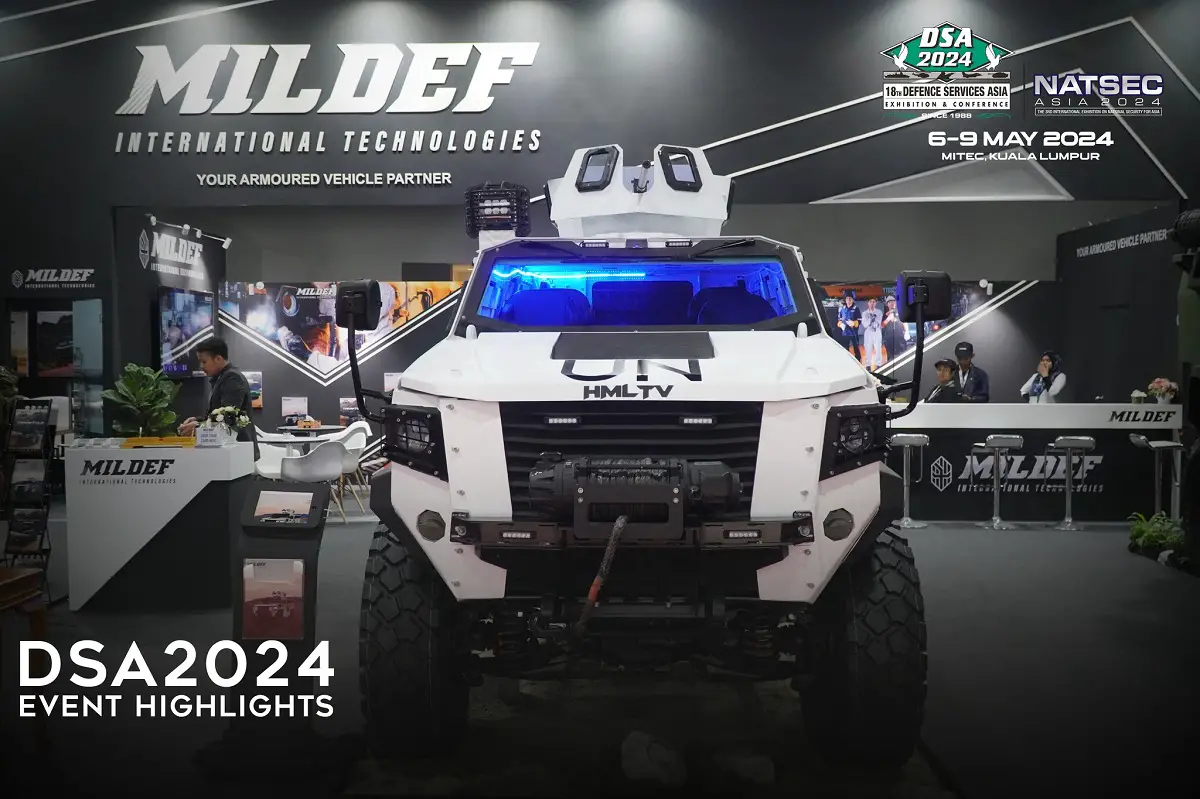Malaysian defense company Mildef International Technologies (Mildef) unveiled three 4×4 armoured vehicles aimed at different missions. The company have successfully designed and manufactured a High Mobility Armoured Vehicle (HMAV) made in Malaysia, inspired by a chain of events following the “Lahad Datu standoff” in 2013. The organization believes through this effort, Malaysia could reduce dependency on foreign military technologies in near future. MILDEF was founded as Kembara Suci SDN BHD in 2005. MILDEF core service to the military and defence industry compasses research & development (R&D), design, fabrication, and maintenance. Beyond catering to the needs of the Malaysian Army, MILDEF eyes a significant export market for the light armored vehicles. Potential buyers include countries such as South Africa, Turkey, the Middle East, and Malaysia’s neighboring nations. The Mildef’s light armored vehicle positions itself as a formidable contender in the global armored vehicle market.

At the DSA 2024 exhibition, a specialized version of the High Mobility Light Tactical Vehicle (HMLTV) designed to meet the rigorous demands of United Nations missions took center stage. Adorned in a striking white hue with unmistakable UN markings, this iteration of the HMLTV underscores Malaysia’s commitment to global peacekeeping efforts. Weighing in at approximately 6.7 tonnes. Powered by a Cummins engine, it mirrors its counterpart not only in size but also in performance. With a capacity to accommodate a crew of two, along with seating for five passengers and a dedicated gunner, the vehicle is a formidable asset in various operational scenarios. The latter manages protected gun mount armed with a 12.7 mm heavy machine. As Malaysia seeks to bolster its military capabilities and contribute to international peacekeeping efforts, the HMLTV emerges as a versatile asset poised to navigate the complexities of modern warfare with precision and agility.

The Tarantula made its debut in 2021 with its initial version tipping the scales at 14 tonnes. However, responding to feedback from the Malaysian Army, the second generation Tarantula underwent significant weight reduction while maintaining its formidable protection. The armored vehicle weighing 12 tonnes accommodates a crew of three along with seven dismounts who enter through two front-hinged doors on each side. Atop the vehicle showcased at DSA, a dual remotely controlled weapon station is mounted, armed with both a 12.7 mm and a 7.62 mm machine gun. Additionally, four sets of four 76 mm grenade launchers are positioned at each corner of the roof. The Tarantula offers Level 3 frontal protection and Level 2/3 side protection. Its mine blast resistance is rated at Level 2b. Powering this robust vehicle is a Caterpillar C7 engine generating 340 horsepower, resulting in a power-to-mass ratio of 28 hp/tonne. It achieves a top speed of 120 km/h on roads and can cover a maximum range of 700 km.

The Weapon Carrier Vehicle (WCV) presents itself as a robust platform, boasting a gross vehicle mass of 6.8 tonnes and a commendable 900 kg payload capacity. The WCV showcased its adaptability by hosting rotary wing unmanned air systems (UAS) on its rear flatbed. Designed to accommodate up to four personnel, its accessibility is facilitated by two front-hinged doors per side, ensuring swift ingress and egress even in high-pressure situations. Moreover, the crew cab’s protection at STANAG Level 1 underscores the vehicle’s commitment to ensuring the safety of its occupants. Powering this formidable machine is a Cummins ISB 4.5-liter engine, delivering 250 hp and yielding an impressive power-to-mass ratio of 41 hp/tonne. Boasting a gross vehicle mass of 6.8 tonnes, it can effortlessly handle a payload of 900 kg while accommodating up to four personnel. Access to the vehicle is facilitated through two front-hinged doors per side, ensuring quick and efficient entry and exit for the crew.















